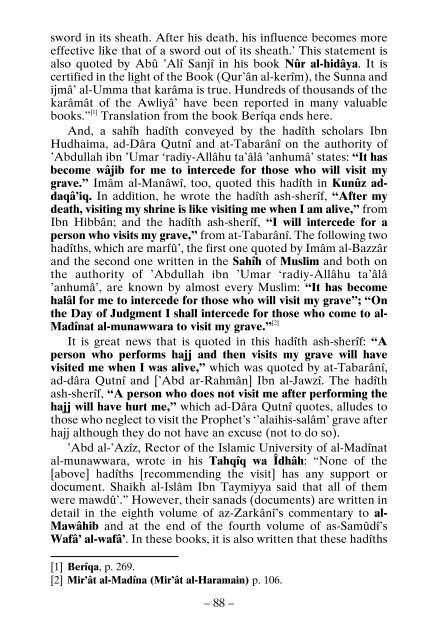The Sunni Path
THE SUNNI PATH The beginning of (The Sunni Path), the book by a statesman of the Ottoman Empire Ahmet Cevdet Pasha (Ma’lûmat-ı Nâfia=Beneficial Information), gives a succinct information about how to believe in the religion of Islam and makes the classification of the science of Islam. Imâm-ı Gazâli, one of the greatest savants of Islam, briefly explains the explanations of Ahl-i-sunnat savants of the true religion of Islam preached by Muhammad ׳alayhissalâm. In addition to this, the life of Imâm-ı A’zam Ebû Hanifa, a great Ahl-i-sunnat savant, is summarized in the book (The Sunni Path). Besides, given are an answer to the slanderers and an explanation to (How to be a True Muslim?)
THE SUNNI PATH
The beginning of (The Sunni Path), the book by a statesman of the Ottoman Empire Ahmet Cevdet Pasha (Ma’lûmat-ı Nâfia=Beneficial Information), gives a succinct information about how to believe in the religion of Islam and makes the classification of the science of Islam. Imâm-ı Gazâli, one of the greatest savants of Islam, briefly explains the explanations of Ahl-i-sunnat savants of the true religion of Islam preached by Muhammad ׳alayhissalâm. In addition to this, the life of Imâm-ı A’zam Ebû Hanifa, a great Ahl-i-sunnat savant, is summarized in the book (The Sunni Path). Besides, given are an answer to the slanderers and an explanation to (How to be a True Muslim?)
Create successful ePaper yourself
Turn your PDF publications into a flip-book with our unique Google optimized e-Paper software.
sword in its sheath. After his death, his influence becomes more<br />
effective like that of a sword out of its sheath.’ This statement is<br />
also quoted by Abû ’Alî Sanjî in his book Nûr al-hidâya. It is<br />
certified in the light of the Book (Qur’ân al-kerîm), the Sunna and<br />
ijmâ’ al-Umma that karâma is true. Hundreds of thousands of the<br />
karâmât of the Awliyâ’ have been reported in many valuable<br />
books.” [1] Translation from the book Berîqa ends here.<br />
And, a sahîh hadîth conveyed by the hadîth scholars Ibn<br />
Hudhaima, ad-Dâra Qutnî and at-Tabarânî on the authority of<br />
’Abdullah ibn ’Umar ‘radiy-Allâhu ta’âlâ ’anhumâ’ states: “It has<br />
become wâjib for me to intercede for those who will visit my<br />
grave.” Imâm al-Manâwî, too, quoted this hadîth in Kunûz addaqâ’iq.<br />
In addition, he wrote the hadîth ash-sherîf, “After my<br />
death, visiting my shrine is like visiting me when I am alive,” from<br />
Ibn Hibbân; and the hadîth ash-sherîf, “I will intercede for a<br />
person who visits my grave,” from at-Tabarânî. <strong>The</strong> following two<br />
hadîths, which are marfû’, the first one quoted by Imâm al-Bazzâr<br />
and the second one written in the Sahîh of Muslim and both on<br />
the authority of ’Abdullah ibn ’Umar ‘radiy-Allâhu ta’âlâ<br />
’anhumâ’, are known by almost every Muslim: “It has become<br />
halâl for me to intercede for those who will visit my grave”; “On<br />
the Day of Judgment I shall intercede for those who come to al-<br />
Madînat al-munawwara to visit my grave.” [2]<br />
It is great news that is quoted in this hadîth ash-sherîf: “A<br />
person who performs hajj and then visits my grave will have<br />
visited me when I was alive,” which was quoted by at-Tabarânî,<br />
ad-dâra Qutnî and [’Abd ar-Rahmân] Ibn al-Jawzî. <strong>The</strong> hadîth<br />
ash-sherîf, “A person who does not visit me after performing the<br />
hajj will have hurt me,” which ad-Dâra Qutnî quotes, alludes to<br />
those who neglect to visit the Prophet’s ‘’alaihis-salâm’ grave after<br />
hajj although they do not have an excuse (not to do so).<br />
’Abd al-’Azîz, Rector of the Islamic University of al-Madînat<br />
al-munawwara, wrote in his Tahqîq wa Îdhâh: “None of the<br />
[above] hadîths [recommending the visit] has any support or<br />
document. Shaikh al-Islâm Ibn Taymiyya said that all of them<br />
were mawdû’.” However, their sanads (documents) are written in<br />
detail in the eighth volume of az-Zarkânî’s commentary to al-<br />
Mawâhib and at the end of the fourth volume of as-Samûdî’s<br />
Wafâ’ al-wafâ’. In these books, it is also written that these hadîths<br />
[1] Berîqa, p. 269.<br />
[2] Mir’ât al-Madîna (Mir’ât al-Haramain) p. 106.<br />
– 88 –

















